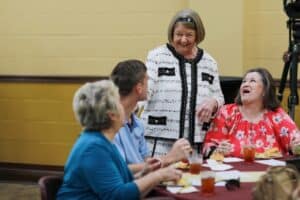POPLARVILLE – Bobby Weaver remembers his first trip to Poplarville in January 1958 as clear as if it were yesterday. We loaded up the car one day, another boy and myself, and drove to Poplarville. His daddy let us out on a Sunday afternoon on campus, sight unseen, said Weaver. It was one of the best decisions I ever made. Weaver, 72, of Talladega, Ala., went on to be an All-State and All-American quarterback at Pearl River Community College (1958-59). He was the quarterback for legendary Coach Dobie Holden who implemented the South’s first pro_set offense. The passing offense, which had been tried at only one other school in the nation, enabled Weaver to pass for 16 touchdowns in 1958 and 24 touchdowns in 1959. On three occasions Weaver passed for four touchdowns in one game. The 1958 Wildcats posted an 8_ 2 record and defeated Wharton, Texas 30_20 in the Hospitality Bowl. In 1959 Weaver led the Wildcats to a state championship, a 10_0_1 record and a Hospitality Bowl 30-0 victory over Henderson, Texas. On Tuesday in Jackson, Weaver was inducted into the Mississippi Community College Sports Hall of Fame. He is PRCC eighth inductee into the JuCo Sports Hall of Fame, which began in 2007. Weaver, a member of Childersburg (Ala.) High School 1956 state championship football team, signed with Memphis State out of high school. Leg problems kept him out of school that fall semester. There was an assistant coach at Childersburg – Charley Schell – who had played at Pearl River and he convinced me to come down there, said Weaver. I only weighed 160 pounds and he thought I could play two years, get a little bigger, and have a chance to play at a bigger school. The plan worked and Weaver gives all the credit to Coach Holden. He went through spring drills at PRCC that first year and looked forward to the first season in the fall. Then … Dobie wrote me that first summer and asked me to come in a few weeks early because we were going to put in a new offense, said Weaver. We had been using the belly series, mostly running the ball. He put in a pro offense and we were going to throw it. That was all new to those folks back then. They didnt know how to cover (the receivers). (Dobie) could see that I could throw it and we had people like John McElroy, Elmer Cook and Joel Smith who could catch it. Coach Holden had confidence in his ideas. A lot of coaches might be afraid to make a change like that, but he didn’t. He felt like he had the personnel to do it. Weaver was more than just a throwing quarterback for the Wildcats. He also started at defensive back and he was the team punter. Back then, you had to play 60 minutes, he said. He was the team captain as a sophomore and received the school best athlete award. He also was the third baseman on the PRCC baseball team. It was a great time in my life, said Weaver. We all loved it down there. I don’t know how Prof (Marvin) White stood all of us in that dormitory. That the reason we are all still so close. It was at the Hospitality Bowl that Hank Stram, later a coach of the Kansas City Chiefs and New Orleans Saints, recruited Weaver to play for the University of Miami. He was also recruited by Paul Bear Bryant at Alabama, Georgia, LSU and a slew of other major schools. Georgia had a coach at the time who came to every one of our games, said Weaver. Dobie wanted me to go there. Wally Butts was the coach and threw the ball a lot. Then Hank Stram invited me down to Miami during the Christmas holidays. I couldn’t turn down a trip to Miami. I wore Bermuda shorts the whole time I was there while it was freezing back home. He chose Miami and after a week there, he left and drove to Athens, home of the University of Georgia, and stayed a few days. I couldn’t make up my mind where to play and it was in the newspapers about how Bobby Weaver couldn’t make up his mind, he said. He wound up back at Miami for two years. Weaver led the Hurricanes to a startling win over Penn State, the No. 3 team in the nation at that time. Weaver was a two-sport letterman at Miami, lettering in football and baseball. I did have invitations to tryout with the Giants and the Lions, but I didn’t go, said Weaver. It wasn’t as big a deal back then as it is now. When I left Miami, I was tired of playing. After graduating from Miami, he attended law school and graduated in 1965. He was one of the youngest in history to be elected to the Alabama State Senate where he served two terms. I was with the junior college system in Alabama for several years, doing some consulting work, he said. I worked some in the timber industry, then practiced law. I did a little of everything.
© 2022 Pearl River Community College







